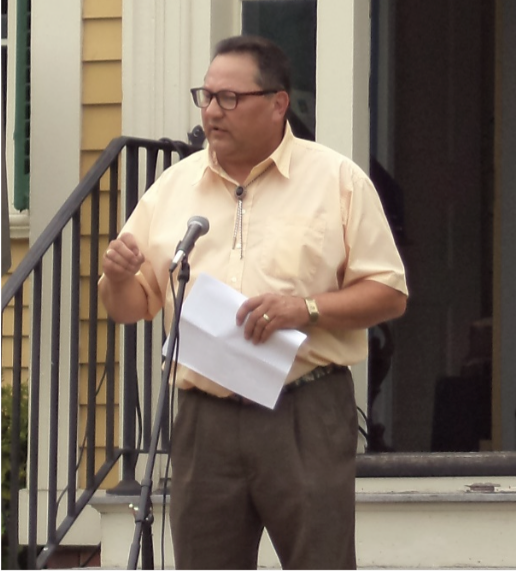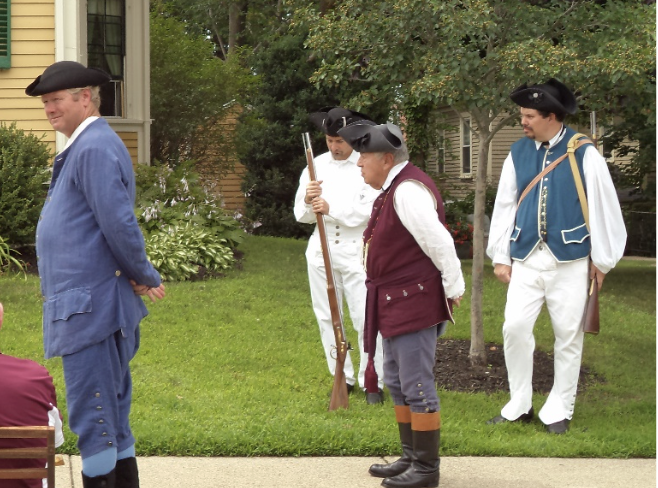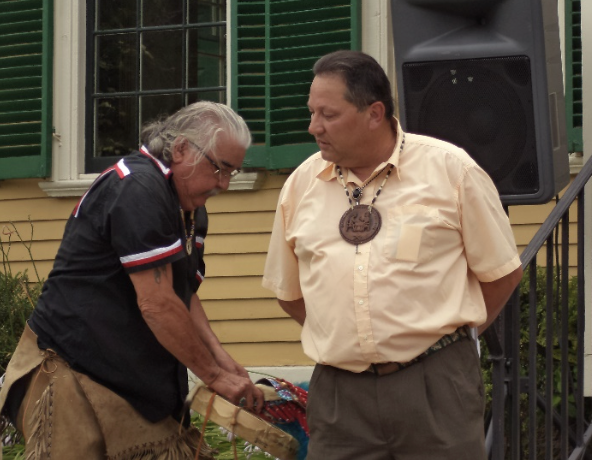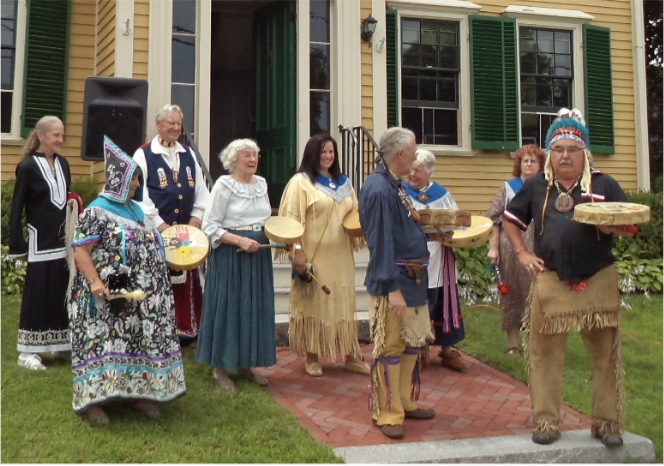
This article is part of a series on local history provided by the Historical Society of Watertown. It was written by Joyce Kelly, Board member of the Historical Society of Watertown. Joyce writes articles for the newsletter and is the newsletter editor. This was published in our October 2014 newsletter, “The Town Crier.”
The Historical Society once again reenacted the reading of the Declaration of Independence from a Council Chamber window on the 2nd floor of the Edmund Fowle House, first done on July 18, 1776. We also celebrated the Treaty of Watertown, signed on July 19, 1776 in the Council Chamber of the Edmund Fowle House.
This year, we were very pleased to have Henry Bear as our special guest. Mr. Bear is a descendant of two of the signers of the Treaty of Watertown – Ambrose Bear and Newell Saulis (their names were recorded as Ambrose Var and Newell Wallis on the Treaty and in the minutes from 1776). Henry Bear is also the Maliseet Tribal Representative to the Maine House of Representatives.
After introductions from Historical Society President Marilynne Roach, Provincial Guard member Steve Steadman read an introduction about the Declaration to about 50 guests who were gathered in front of the house. Historical Society Councilor Bob Childs proceeded to read the Declaration of Independence from the Council Chamber window.
The Treaty of Watertown was introduced by a representative of our Native American guests, Noel Rainville, after which, the Treaty was read by Colonial re-enactor and folklorist John Horrigan. Our special guest, Rep. Henry Bear then came to the microphone to speak to us about his ancestors who signed the Treaty of Watertown, details about the men involved in the agreement, and some of his thoughts about both. Following are some of his remarks.
Wuleewun and thank you…I am Henry John Bear, a member of the St. John River Indians and present-day Maliseet Tribe. I am the elected Maliseet Tribal Representative to the Maine House
of Representatives and a present-day relative of the late Maliseet Chief Ambrose Bear who was the lead spokesman during the July 10th through July 19th , 1776 treaty negotiation with the duly authorized representatives of the United States of America in this very place some 238 years ago today. I am also a present-day relative of Newall Saulis, another signer of that treaty. On behalf of my Tribe, I bring you greetings and will briefly share with you information about Maliseet Chief Ambrose Bear and our continuing Maliseet Tribal perspective with regard to this 1776 treaty with the United States of America.
… I want to mention that yesterday I had the privilege of holding the actual Watertown Treaty of 1776 in my hands, (Editor’s Note: located at the Massachusetts Archives in Dorchester) the original treaty signed by all of the Chiefs and headmen, and the Congressional Representatives and agents who were present here in Watertown at that time. When I placed my hand on the treaty at the very place it had been signed by Ambrose Bear a great pride swelled within me.
It was a reminder of the pride I feel whenever I observe the flag of the United States of America … and the pride I feel whenever the Eagle Feather is brought forward before us in the tradition of my ancestors and elders. To me they are a continuing reminder that since the first days of this great American nation, beginning shortly after the signing of this first treaty here in Watertown, our respective peoples and warriors have honorably served and recognized each other’s sovereign interests as allies, as brothers, as equals.

That was what Maliseet Chief Bear set out to achieve as the lead spokesman for all of the eastern Indians. That is what Chief Bear was duly authorized to negotiate and conclude in this treaty, a treaty that he would successfully have ratified by an overwhelming majority of all the Maliseet Chiefs and people of the St. John River then, and still, centered in and around present day Meductic and Ecpahauq within our tribal homeland, which we have always called the Wuloostook, and what the United States calls the Aroostook region.
Chief Bear is believed to have lived to 1780 and was not a young man when he died. I understand that Ambrose had either observed, participated in or negotiated every treaty with the English and later, the British, including the treaties of 1725 and 26, 1749, 1760 and, finally, the Watertown Treaty of 1776 with British rebels turned “Americans.”
According to the historical record, it was Chief Ambrose Bear whom Colonel Jonathan Allen called upon to lead him and his colonial soldiers down the Maliseet Trail from the St. John River to Machias, which culminated in the successful Battle of Machias and defense of the entire northeast region from any further British attacks for the duration of the Revolutionary War. It is important to note the fact that at the time of both the Declaration of Independence on July 4th through the 18th , 1776 and the signing of the Watertown Treaty of the same year, General George Washington, the Commanding General of the entire Continental Army could muster no more than 800 American soldiers at the time. On July 8 th , 1776…the Continental Congress resolved to authorize General Washington to secure the Treaty. On July 11 th he wrote back stating he had written the General Court of Massachusetts Bay and that he desired five or six hundred of the Eastern Indians to be enlisted for two or three years.
Thus the 600 tribal members to be raised according to the treaty terms negotiated by James Bowdoin and Chief Ambrose Bear, was a result of George Washington’s express desire. His plan was to add 250 white soldiers to that number in order to form the whole regiment under American officers, which would have provided a significant advantage for General Washington. In 90 canoes with a force of more than 480 Indians, Maliseet Chief Bear and my other treaty
relative and treaty signer, Newell Saulis, kept our tribe’s promises, in good faith, under the express terms of the Watertown Treaty, and they did so believing that this treaty was binding on both the Maliseet Tribe and the United States of America, a treaty that has never been expressly abrogated or terminated by the Maliseet or the United States and is, therefore, still in force and relied upon to this day.
To be clear, this Declaration of Independence and this Watertown Treaty of a few days later was not understood by the United States or by Maliseet Chief Ambrose Bear to be temporary, but instead was and still is, understood to have a continuing existence, at least with respect to the principles of freedom and equality in the Declaration, and with respect to the mutual pledges of aid and assistance, mutual pledges of respecting each other’s sovereignty and jurisdictions, mutual pledges guaranteeing trade and exclusive Maliseet tribal access to tribal land and natural resources that such trade relied upon contained in the Treaty. In fact, United States citizens who were trespassing, it was agreed, were to be removed from Maliseet tribal lands in the Maine district and, as Congressional records indicate, trading posts or truckhouses at both Machias and Old Town were furnished and funded by the United States Congress for nearly half a century after the conclusion of the American’s War for Independence.

It is clear in the minutes of the treaty negotiations that this was the perspective of Chief Ambrose Bear and the other tribal delegates who signed the treaty at the time, and it is still the perspective of the Maliseet Tribe today. And that perspective, to be clear, is that the Declaration of Independence of the United States of America and its companion document, the Watertown treaty of 1776 both continue in effect and both certainly deserve to be honored to this day.
In concluding I would urge each of us to ensure our respective governments and Peoples continue to honor this Treaty, to hold to its promises, its duties and its obligations so that we can mutually and separately continue to share in its benefits – that of alliance, that of friendship, that of trade for necessaries and conveniences, and for a continuing relationship as co-equals, as brothers, one brother not subservient nor superior to the other, just as both General Washington clearly stated in his letters and just as the negotiators and signers indicated in the plain language of this Treaty.
To that end, this celebration is both appropriate and necessary to ensure that this message is passed on to our respective children and grandchildren, that there still exists such a unique, one-of-a-kind treaty-based relationship between our Maliseet Tribe and the people of the United States of America and that, because of this Treaty, it can contribute to there being an even better and more secure tomorrow for them.
In my tribal homeland there now exists and Aroostook Treaty Education Center that, like your Historical Society of Watertown, seeks to inform and educate about this Declaration of Independence and this Treaty to ensure that as we move further into the 21st century and this new millennium, we do so by reminding ourselves and others of our historic alliance, that our respective national stories are married at the hip, and that we, the Maliseet People, are your first and oldest partners in this continuing and wonderful American adventure, an adventure that still requires we adhere to the principles and promises contained in your Declaration of Independence and our July 19, 1776 Treaty.
Wuleewun and thank you for hearing me today.

In honor of both the Declaration of Independence and the Treaty of Watertown the Historical Society of Watertown will present
“What Happened in Watertown on July 18 & 19, 1776?”
Join us in the air-conditioned, Watertown Senior Center for the story in words and a slideshow of photos behind Watertown’s first public reading of the Declaration of Independence and the signing of the Watertown Treaty between the Mi’kmaq and St. John (aka Maliseet) in Canada and the newly formed United States.
The Treaty of Watertown was the first international US treaty. Learn the significance of both documents and discover the role played by the Edmund Fowle House (28 Marshall St.).
Watertown Senior Center, 31 Marshall St. Watertown
Tuesday July 18, 2023, from 5:00PM- 6:30PM
Donations of non-perishable food items for the Watertown Food Pantry will be appreciated.
Thanks to the Watertown Senior Center for hosting this event.
Light refreshments will be served.
For further information and directions see www.HistoricalSocietyofWatertownMA.org or email joycekel@aol.com
The program is free and open to the public